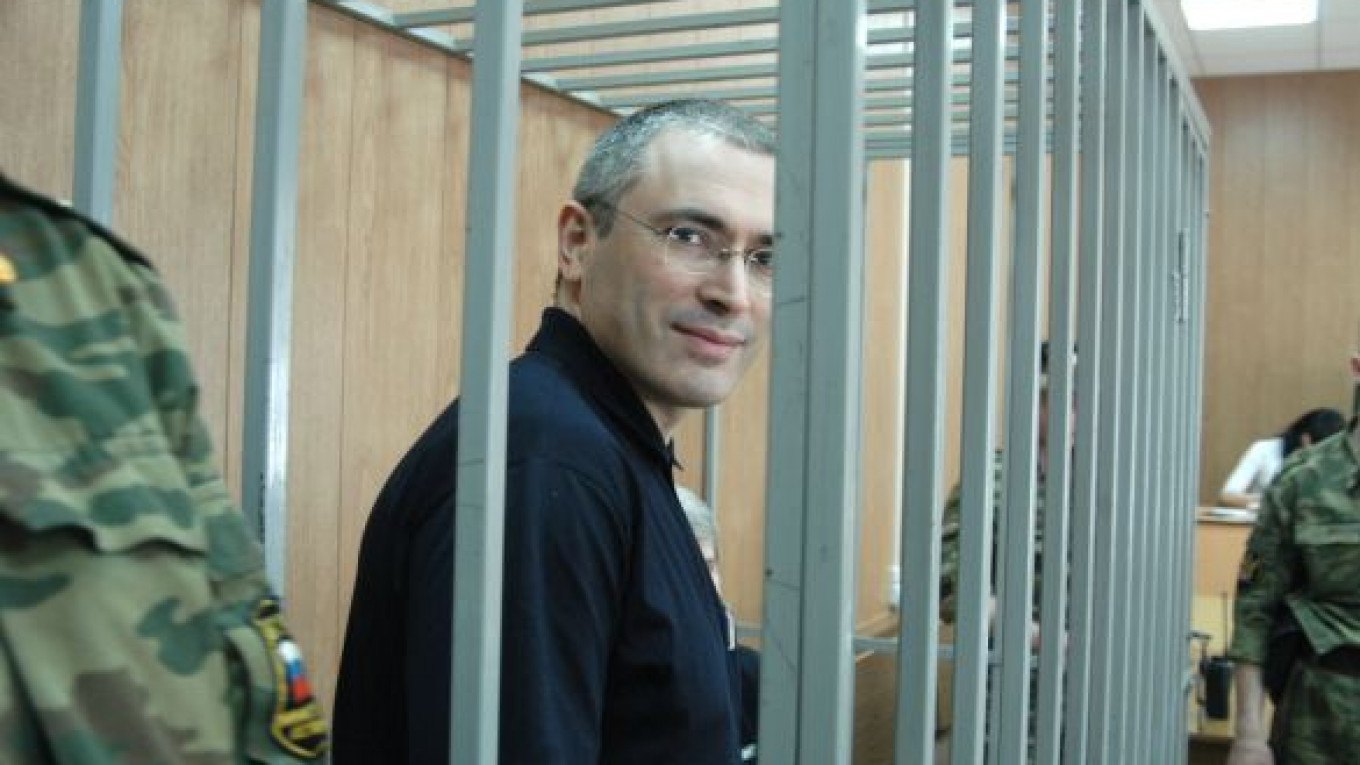Jailed oil tycoon and former Yukos head Mikhail Khodorkovsky, who is set to be freed next year, may face new criminal charges, the Deputy Prosecutor General said.
"Several charges against Khodorkovsky and other people are being probed and have good judicial prospects," Alexander Zvyagintsev said in an interview with Interfax on Friday.
Speculation over a third case against Khodorkovsky has been circulating in the media for the last two years, but this is the first official comment on the matter.
The remarks also follow on the heels of news that President Vladimir Putin supports an amnesty to mark the 20th anniversary of the Constitution next year. Mikhail Fedotov, the head of the Kremlin's human rights council, said the amnesty could apply to Khodorkovsky.
However, Khodorkovsky's lawyer, Vadim Klyuvgant, said the comments by the Prosecutor General's Office were likely nothing more than unverified information.
"I do not know anything about a new case, and I understood nothing from these comments, which are a mixture of fog and lies; I cannot comment on them as if they are a fact," he said, adding that the Prosecutor General's Office had no authority to comment on the Yukos case, as the case was under the jurisdiction of the Investigative Committee.
He added that neither he nor his client had been informed by prosecutors of a possible new case, meaning that it would be a violation of Russian law if a case were really opened.
An unidentified source told Interfax that the possible new charges stemmed from the original case opened in 2003 against Yukos, which still has not been closed.
That case became the basis for all subsequent cases brought against Khodorkovsky, his business partner Platon Lebedev and other Yukos employees.
The source also said that as part of the new case, investigators were looking into the laundering of $10 billion, which was allegedly stolen by Khodorkovsky and others. In addition, the source said, several other criminal cases were opened to determine whether that money was used "for the purpose of changing legislation in Russia."
"Khodorkovsky's procedural status in these cases has not been defined yet, and, at the moment, he is neither a suspect nor an accused person, but this is a matter of time," the source said.
Klyuvgant said there was no article in the Criminal Code that would impose punishment for attempting to alter legislation. "Everything that investigators could make up about laundering" was used in the second case against Khodorkovsky that led to a guilty verdict in 2010, Klyuvgant said.
"I cannot call this information anything but idiocy," he said.
Khodorkovsky has spent 10 years in prison after being found guilty in two criminal cases. He is supposed to be released next August. He and Lebedev were arrested in 2003 on fraud and tax evasion charges and sentenced to nine years in prison in 2005. The case was widely seen as political punishment of Khodorkovsky for challenging President Vladimir Putin's authority.
Five years later, Lebedev and Khodorkovsky were tried together again in a second case and convicted of stealing oil from Yukos and laundering the proceeds. Last December, the Moscow City Court reduced their sentence from 13 to 11 years after conducting a review.
In his interview, Zvyagintsev said that the upcoming amnesty would probably not apply to Khodorkovsky, since he was convicted of "extremely serious crimes."
Klyuvgant, on the other hand, said the previous verdicts did not contain charges that would qualify as "extremely serious crimes."
Contact the author at e.kravtsova@imedia.ru
A Message from The Moscow Times:
Dear readers,
We are facing unprecedented challenges. Russia's Prosecutor General's Office has designated The Moscow Times as an "undesirable" organization, criminalizing our work and putting our staff at risk of prosecution. This follows our earlier unjust labeling as a "foreign agent."
These actions are direct attempts to silence independent journalism in Russia. The authorities claim our work "discredits the decisions of the Russian leadership." We see things differently: we strive to provide accurate, unbiased reporting on Russia.
We, the journalists of The Moscow Times, refuse to be silenced. But to continue our work, we need your help.
Your support, no matter how small, makes a world of difference. If you can, please support us monthly starting from just $2. It's quick to set up, and every contribution makes a significant impact.
By supporting The Moscow Times, you're defending open, independent journalism in the face of repression. Thank you for standing with us.
Remind me later.






